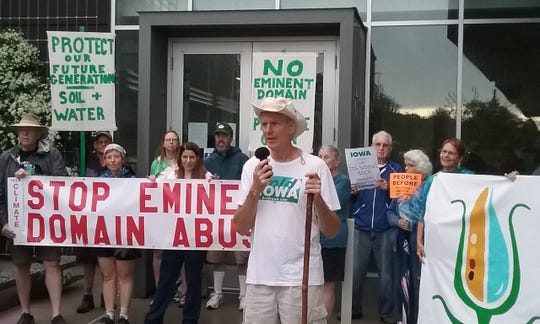September 1, 2018. After a night of thunderstorms, we took down our tents in wind and rain, and loaded our duffle bags into the gear truck. I was frantically typing away to try to get a quick blog post published. The first step is to upload the photos from my camera to the computer, and then edit the photos, which are then available to insert into the blog post.
We then carpooled to the Iowa Utilities Board (IUB) for a press conference to announce the First Nation-Farmer Climate Unity March. One of the primary goals of the March is to call attention to the IUB’s improper approval of eminent domain to force Iowa landowners to allow construction of the Dakota Access Pipeline on their property. The lawsuit by the Sierra Club and landowners against the IUB will be heard in the Iowa Supreme Court September 12.
The Iowa State Patrol kept an eye on us.
Regina Tsosie sings:
A reporter for the Des Moines Register, Ian Richardson, was at this press conference, and also came to Birdland Park for the beginning of the March (story below).
Reporters from WHO TV, the local NBC news station, were also at the press conference.
My friends Jon Krieg, AFSC, and his wife Pattie McKee joined us at the press conference. Jon hadn’t planned on joining the March, but decided to walk with us this first day. Besides Jon, Peter Clay and I were the Quakers on the March. Later in the week my friend and roommate when we were at Scattergood Friends School, Lee Tesdell, spoke to us about his innovative agricultural practices.
After the press conference we carpooled back to Birdland Park for prayers and to begin the March.
Group to march 100 miles to protest Dakota Access Pipeline by Ian Richardson, The Des Moines Register Sept. 1, 2018

A group of marchers led by Bold Iowa’s Ed Fallon departs from Birdland Park. The group will make an eight-day trek to Fort Dodge to raise awareness and show unity against the Dakota Access Pipeline.(Photo: Ian Richardson/The Register)Buy Photo
Walking sticks in hand and raincoats wrapped around their waists, about two dozen people embarked Saturday on an eight-day trek that will take them nearly 100 miles from Des Moines to Fort Dodge.
The First Nation-Farmer Climate Unity March, organized by the environmental advocacy groups Bold Iowa and Indigenous Iowa, is said by organizers to be show of unity by opponents of the Dakota Access Pipeline.
“It could lead to a potential break and poison our water,” Regina Tsosie, co-founder of Sage Sisters and president of the Native American Coalition of the Quad Cities, said of the pipeline. “But it also has desecrated our sacred sites.”
Tsosie’s remarks came as a group gathered outside the Iowa Utilities Board office early Saturday morning for a short pre-march meeting. Some in attendance held large signs with messages including “Stop eminent domain abuse” and “Protect our future generation soil and water.” 
Ed Fallon, of Bold Iowa, speaks outside the Iowa Utilities Board office prior to the beginning of the First Nation-Farmer Climate Unity March. The march route will stretch nearly 100 miles across 8 days. (Photo: Ian Richardson/The Register)
MORE: Army Corps says no new impacts found in Dakota Access review
The group then drove to Birdland Park to officially begin the march. Members plan to walk 10-15 miles per day and conclude their journey in Fort Dodge on Sept. 8.
Ed Fallon, who heads Bold Iowa, said he believes the number of participants will grow as high as 50 during points throughout the week.
“I’d say half of that group are on for the entire march, but there are people coming and going,” he said.
The $3.8 billion Dakota Access Pipeline runs nearly 1,200 miles through North Dakota, South Dakota, Iowa and Illinois. Built by Texas-based Energy Transfers Partners, it has been running since June 2017 and has a capacity to transport about 520,000 barrels of oil daily.
The marchers’ route will travel through four of the 18 counties where the pipeline runs in Iowa and the group will cross back and forth over the pipeline a number of times in three of those counties, Fallon said. The group plans to interact with landowners and hold nightly discussions.

Rodney White/Register photos A bending crew wrangles a segment of pipe for the Dakota Access pipeline near Baxter on Aug. 16. A bending crew wrangling pipe for the Bakken pipeline near Baxter, Iowa, Tuesday Aug 16, 2016. They have to bend the pipe to match the contour of the land before welding and burying the sections. Workers clear and grade the land, bend pipe and dig trenches in countryside outside Newton just north of Interstate-80. (Photo: Rodney White, Rodney White/The Register)
Fallon said the march is also a show of solidarity with the Sierra Club and Iowa farmers who have appealed to the Iowa Supreme Court over the state’s decision to authorize the use of eminent domain for the pipeline project.
Marchers will camp at farms and parks using a trailer designed with environmental-conscious bathroom facilities and solar-powered showers. The first night’s stop was Griffieon Farm in Ankeny. The march will end the afternoon of Sept. 8 at City Square Park in Fort Dodge.
Outside the Iowa Utility Board office, Indigenous Iowa founder Christine Nobiss said she hopes the march sends a message to the state regulator.
“It needs to be made very clear to the (Iowa Utilities Board) that what they did was wrong and a real mistake on their part,” she said. “We’re going to make them see that what they did is not OK.”
Read or Share this story: https://dmreg.co/2PUUeih











One thought on “Iowa Utilities Board Press Conference”